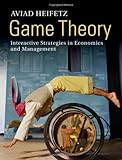Game theory : interactive strategies in economics and management
Material type: TextPublication details: New Delhi CUP 2012Description: xi, 448 pagesISBN: 9780521764490 (Hardback); 9780521176040 (Paperback)Subject(s): Game theory | Economics | Management | MicroeconomicsDDC classification: 330.015 193 Summary: "Game theory is concerned with strategic interaction among several decision-makers. In such strategic encounters, all players are aware of the fact that their actions affect the other players. Game theory analyzes how these strategic, interactive considerations may affect the players' decisions and influence the final outcome. This textbook focuses on applications of complete-information games in economics and management, as well as in other fields such as political science, law and biology. It guides students through the fundamentals of game theory by letting examples lead the way to the concepts needed to solve them. It provides opportunities for self-study and self-testing through an extensive pedagogical apparatus of examples, questions and answers. The book also includes more advanced material suitable as a basis for seminar papers or elective topics, including rationalizability, stability of equilibria (with discrete-time dynamics), games and evolution, equilibrium selection and global games"--Summary: "Social interaction is essential to human life. How do people choose what to do when they encounter one another? And how do organizations, firms or countries interact? Game Theory is a modeling tool designed to represent and analyze such strategic interaction. The first part of this book is devoted to introducing the basic building blocks of game theory. The parties to the interaction are called players, the courses of actions available to them are their strategies, and the payoffs of each player from the various profiles of strategies (of all players) represent the way each player ranks the possible outcomes of the interaction from her own individual point of view"--
TextPublication details: New Delhi CUP 2012Description: xi, 448 pagesISBN: 9780521764490 (Hardback); 9780521176040 (Paperback)Subject(s): Game theory | Economics | Management | MicroeconomicsDDC classification: 330.015 193 Summary: "Game theory is concerned with strategic interaction among several decision-makers. In such strategic encounters, all players are aware of the fact that their actions affect the other players. Game theory analyzes how these strategic, interactive considerations may affect the players' decisions and influence the final outcome. This textbook focuses on applications of complete-information games in economics and management, as well as in other fields such as political science, law and biology. It guides students through the fundamentals of game theory by letting examples lead the way to the concepts needed to solve them. It provides opportunities for self-study and self-testing through an extensive pedagogical apparatus of examples, questions and answers. The book also includes more advanced material suitable as a basis for seminar papers or elective topics, including rationalizability, stability of equilibria (with discrete-time dynamics), games and evolution, equilibrium selection and global games"--Summary: "Social interaction is essential to human life. How do people choose what to do when they encounter one another? And how do organizations, firms or countries interact? Game Theory is a modeling tool designed to represent and analyze such strategic interaction. The first part of this book is devoted to introducing the basic building blocks of game theory. The parties to the interaction are called players, the courses of actions available to them are their strategies, and the payoffs of each player from the various profiles of strategies (of all players) represent the way each player ranks the possible outcomes of the interaction from her own individual point of view"--
| Item type | Current library | Collection | Call number | Status | Date due | Barcode |
|---|---|---|---|---|---|---|
 BK
BK
|
Kannur University Central Library Stack | Stack | 330.015 193 HEI/G (Browse shelf (Opens below)) | Available | 36918 |
"First published in Hebrew by Open University of Israel Press 2008"--Verso of title page.
Translation of the author's Ḥashivah asṭraṭegit.
"Game theory is concerned with strategic interaction among several decision-makers. In such strategic encounters, all players are aware of the fact that their actions affect the other players. Game theory analyzes how these strategic, interactive considerations may affect the players' decisions and influence the final outcome. This textbook focuses on applications of complete-information games in economics and management, as well as in other fields such as political science, law and biology. It guides students through the fundamentals of game theory by letting examples lead the way to the concepts needed to solve them. It provides opportunities for self-study and self-testing through an extensive pedagogical apparatus of examples, questions and answers. The book also includes more advanced material suitable as a basis for seminar papers or elective topics, including rationalizability, stability of equilibria (with discrete-time dynamics), games and evolution, equilibrium selection and global games"--
"Social interaction is essential to human life. How do people choose what to do when they encounter one another? And how do organizations, firms or countries interact? Game Theory is a modeling tool designed to represent and analyze such strategic interaction. The first part of this book is devoted to introducing the basic building blocks of game theory. The parties to the interaction are called players, the courses of actions available to them are their strategies, and the payoffs of each player from the various profiles of strategies (of all players) represent the way each player ranks the possible outcomes of the interaction from her own individual point of view"--


There are no comments on this title.